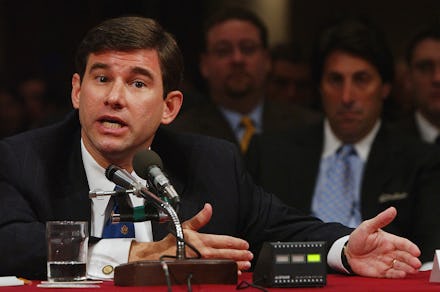One of Trump's Supreme Court picks once compared gay sex to necrophilia and bestiality

President-elect Donald Trump released a "definitive" list of potential Supreme Court nominees back in September. One of the 21 names on his list was former Alabama Attorney General and current federal appeals court judge William Pryor Jr. — a man whose rabidly anti-gay positions and virulent opposition to "political correctness" have inspired fear and concern in his opponents over the course of his career.
Some of the things to which he's compared consensual gay sex are shocking, to say the least.
In 2005, when Pryor was nominated to his position as a federal appeals court judge, Kevin Cathcart — then the executive director of LGBTQ-rights organization Lambda Legal — called him "the most demonstrably anti-gay judicial nominee in recent memory."
Lambda Legal released a statement at the time saying Pryor "has repeatedly shown clear hostility to the rights of lesbians, gay men, bisexuals, transgender people and those with HIV – and also to women, people of color, disabled people and others." The statement also referenced Pryor's 2003 writings on the Lawrence v. Texas case, which eventually led the Supreme Court to strike down laws criminalizing gay sex, leading to a breakthrough moment in the gay rights movement.
While serving as Alabama's attorney general, Pryor had weighed in on Lawrence v. Texas in an amicus brief, coming down firmly on the side of upholding state laws criminalizing consensual same-sex relations.
In it, he claimed to be resisting putting "political correctness above the text and history of the United States Constitution" and compared gay sex to "necrophilia, bestiality, possession of child pornography, and even incest and pedophilia," saying also that "States can and must legislate morality."
His anti-gay track record doesn't end in 2003. Pryor also opposed hearing a challenge to a Florida law that banned gay people from adopting children, the Advocate reported. He also suggested that a Supreme Court decision affirming the rights of LGBTQ people was a result of "new rules of political correctness."
And, while Pryor did endorse a decision in 2011 that categorized discrimination against trans people as sex discrimination, his history of discriminatory and hyperbolic rhetoric targeting gay people — not to mention his opinions on the right to an abortion and the Voting Rights Act — make him a dangerous player.
With Donald Trump poised to nominate a Supreme Court justice to fill the spot left by the death of Antonin Scalia — and potentially nominate another justice or two over the course of his term — there's a distinct possibility that Pryor could ascend to the highest court in the land. It's the thread of judges like Pryor that lead to posit, in an op-ed in the Los Angeles Times on Monday, that "LGBT rights are anything but safe" in a Trump White House.